EENET is documenting and amplifying the voices of Gaza’s educators and learners.
Across Gaza, educators, learners, their families and communities live under constant bombardment from Israeli occupying forces. They are displaced, hungry and denied basic healthcare.
In addition to committing genocide against Gaza’s people, Israel is committing ‘educide’ / ‘scholasticide’ against Gaza’s entire education system. Almost all schools and universities have been damaged or destroyed. Hundreds of teachers and thousands of learners have been killed.
For most Gazans now, participating in or delivering education has become an impossible dream, although some educators and learners have continued to seek small opportunities.
Read and share their stories here and on our Facebook and LinkedIn pages.
#CeaseFireNow
#FreePalestine
#EndTheOccupation
#StopArmingIsrael
#EndIsraeliApartheid
#LearningNeverStops
Asmaa Mustafa
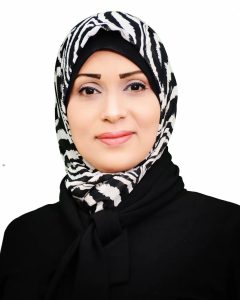
“When schools closed their doors, I decided to become the school, the book, the backpack, and the pen for every child around me in the displacement camps.
I gather with the children daily. We learn through love, educational games, meaningful stories, and recreational activities, hoping to provide some educational first aid.
I firmly believe this can help mitigate the long-term impact of educational disruption and alleviate the current suffering of the children experiencing trauma.”
Fahmi Abu Assi
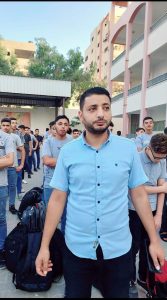
Teacher, aged 38.
“There is a lack of communication between students and teachers, as well as between the education system and students. Internet access is severely limited, available to less than 5% of the population.
Various factors contribute to the widespread disinterest in education, primarily the constant fear of sudden bombings and the daily struggle to fetch water from distant sources due to the destruction of wells by the Israeli army under Netanyahu’s orders. This destruction aims to crush life and eradicate its basic features, compounded by the cutting off of oil supplies needed to operate the remaining wells, hospitals, and other essential services.
Therefore, anyone claiming that there is adequate communication or a psychological drive for learning among students and their families in the Gaza Strip is overlooking the harsh reality. The desire and ability to learn are severely limited and do not represent the majority of Palestinians in Gaza.”
Majd Tabbaa
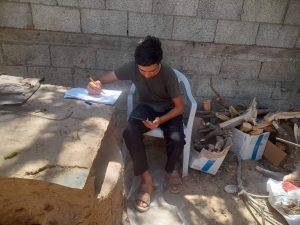
“I insist on contiuing my academic achievement in the most difficult circumstances to save my academic path.
This photo is from our displacement area at Gaza Strip; that lacks the basic necessities of life.
I complete studying online with West Bank schools.”
Bilal Fathi Shubeir
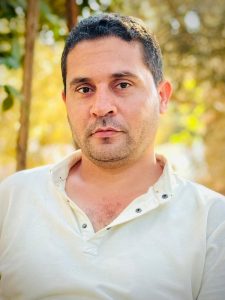
Teacher from Khan Younis, aged 38.
“I am a teacher of English, an educational initiator, interested in cultural exchange activities through learning, art and music.
On a hot day, I met a pupil who had lost weight and got a darker tan due to sunburn. He eagerly expressed how much he misses school. I was deeply affected by a brilliant student’s words. Despite the giant destruction in Gaza Strip, the pupil appeared to carry hope and insist on keeping education for all children in Gaza.
The ‘Feel my Voice’ initiative, initially involving 15 students, has grown to 60 today. It’s a collaboration with volunteer trainers from the UK and US, focusing on storytelling and drawing sessions. This approach enhances creativity, emotional expression, and psychological relief, it also helped promoting fun English language learning activities.
The initiative introduced pen pals with international students, connecting Gazan boys and girls to the world and strengthening their sense of inclusion. It aimed to revitalize education and create an environment for learning, even in difficult situations. Al-Qattan Foundation for Child provided training in drama, music, psychological relief techniques, and post-trauma support. The initiative defends the children’s right to education and called for more training and support from educational entities to prevent children from feeling left behind.”
Dr. Muhammad Awad Shubeir
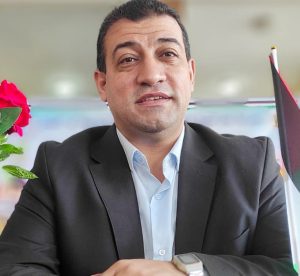
Teacher and Facilitator of Educational Initiatives.
“In the face of the catastrophe and the destruction of education in Palestine, and specifically in Gaza, Palestinian students have lost their lives. Their schools have turned into detention camps and shelters for the displaced. Students, teachers, and educational staff are still paying the price of the ongoing conflict, leading to the collapse of the education system and leaving all Palestinian students lagging behind.
Our demands are inseparable from our right to life and the necessity for our students to enjoy their rights, which have become dreams we strive to achieve! Our students wonder why their rights are violated and why they lose their lives during times of occupation and continued states of emergency. Is it not our right to live and experience a moment of peace like other children around the world, without fear and suffering?
We work with students and children through various educational interventions as a response to achieve recovery, but working in the field is fraught with danger and insecurity. Every day, the scenes of displacement repeat, and the sounds of aircraft that have bombarded every target make it so difficult to pursue your right to education when your right to life is lost.”
Amna Abu Mandil
A volunteer initiative member at an emergency school in Al-Maghazi camp – middle of Gaza Strip.
“An experience full of challenges in impossible situation…
I started with recreational activities and play, which took two weeks of activation, and then began teaching.
I found that the students’ levels had dropped significantly. For example, an eighth-grade student couldn’t remember the basic Arabic grammar rules from the sixth grade, even though she used to be very distinguished. There is a lot of distraction among the students, but they are trying to learn, and I see in them a love for studying, a longing to learn, and a thirst for the previous school setting.”
Muhannad Jamal Abu Hazima
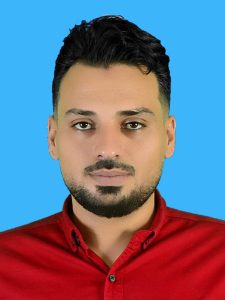
“After the devastating war waged by the occupation on the Gaza Strip, children’s lives have been significantly disrupted, with normal activities like going to school and playing with friends becoming impossible. It has become essential to support these children with activities that help them spend their time positively and alleviate psychological stress.
In one of the displacement camps in Rafah Governorate, the ‘We Love Reading’ initiative was launched. It aimed to enhance the psychological and social well-being of children by creating a supportive environment where they can express themselves and learn enjoyably through integrating reading with play, arts, music, and drama activities.
Although the initiative was temporarily halted due to displacement, it continued actively and energetically in Khan Younis Governorate. Parents played a crucial role in sustaining the initiative, allowing children at the Open University of Jerusalem shelter centre to benefit from the activities provided.
This cooperation and solidarity between parents and the institution significantly contribute to providing the necessary support for children, giving them the opportunity to recover and grow in a more positive and supportive environment.”
Mohammad Moein Al-Khodari
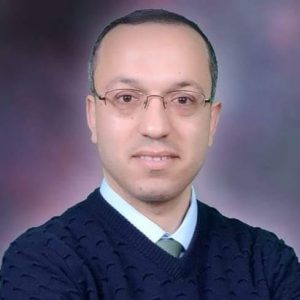
“We have the determination, will, and creativity to continue the process of learning and teaching. The war on Gaza compelled us to leave an educational mark for the children. Out of the professional responsibility entrusted to us, our motto has become ‘We continue with knowledge and education’.”
